Strauss, R: Salome (Jordan)
Introduction
Filmed over three nights in March 2008, this has been one of the quickest turnarounds I've seen from live performance(s) to DVD. It was certainly heralded as a major new production from the Royal Opera, so much so, that it spawned its own South Bank Show episode that filmed the development of the production from the orginal ideas at least 18 months previously. More on this later.
As a director, David McVicar is certainly a popular choice for opera companies worldwide, as they are sure of (at least until any particularly negative reviews come around) selling out the first few performances.
Strauss's opera, based on Wilde's play of the same name, is (or should be, depending on how it's played) one of the most intensely erotic scores written for the stage, reflecting the general decadence of Herod's Biblical court, Herod's own obvious sexual attraction to his step-daughter, Salome (who should be sung, according to the composer, as "a sixteen year old princess with the voice of an Isolde" and religious fanaticism abounding, from both Jokanaan (John the Baptist), and assorted high-ranking Jews invited to supper.
Strauss manages to convey all of this just through the music, yet maybe, McVicar tried a little too hard to depict things literally, in case
it wasn't too obvious.
Audio
It's a very heavy scoring for the orchestra, and necessarily so I'm sure. Sometimes though, the whole sound becomes a bit claustrophobic, and at higher volumes, l missed a lot of the detail I know is in there somewhere. This never covers the soloists however, who are always to the fore, and picked up nicely from most of the stage.
Video
Nothing at all wrong here. The colours, and especially lighting, are picked up wonderfully and the image is as crisp as you would expect from such a modern recording.
Extras
At last, here is a DVD which contains something rather substantial. As I mentioned, those lovely people who bring you the South Bank Show (well, Melvin Bragg anyway) considered this production a worthwhile subject, and I'm very pleased they did. I'm also pleased I watched it after seeing the opera itself, as it meant I had to think about the whys and wherefores on my own (this wasn't something I managed to get to see live unfortunately - so didn't read any programme notes beforehand).
McVicar is a very engaging character, and obviously fully immersed in his role (even though he was working on a few more productions of other works at the same time), and is fairly self-deprecating in a rather charming way, saying "Any director with pretentions of being a genius is a f****** liar. We're only as good as the people we work with". Well, quite.
Ideally, I would have liked to have had more input from Phillipe Jordan, but this seemed to be McVicar's show (judging by the original title of the programme) and so we get very little of interest from the music director.
There is also an interesting, but rather short (although very 'wordy') essay on the origins of Wilde's play, by Steven Price within the booklet.
Conclusion
Incest; executions; suicide; religion, and general debauchery all round. There are the best elements for an opera as far as I'm concerned, and one which Strauss would have loved. I'm sure his own idea was to have set the work at the same time of the original play, and he would have been allowed to do so, even though at the time of Wilde's own production the work was banned, as Biblical characters were not allowed to be portrayed on stage, good guys or bad.
McVicar though, seems to go all 'Nazi' on us, which is always a good way to court controversy, even though 'playing it straight' would be just as shocking if done effectively. The connections between Strauss and his own possible allegiance to 'the Party' are obvious, but as this opera was first performed in 1905, are completely irrelevant. McVicar has therefore seemed to have driven a slightly more tenuous route to the same conclusion, taking inspiration from Pasolini's film Salò, set in Fascist italy in 1944. Here is a society where "Hellish behaviour at every level becomes normality" . This, of course, gives the director carte-blanche to do anything he wants, but McVicar is actually quite tasteful, in his own quietly-spoken way, compared to someone like Calixto Bieito, who may well have had everyone running around naked whilst masturbating in their own excrement.....to make a very important point you understand!
The DVD comes with a small warning on the back saying :"Warning: Contains scenes of nudity and violence". It does indeed, but no more than your casual visit to an art gallery, except with movement. I remember very well that one of my favourite paintings in the Walker Art Gallery in Liverpool when visiting my gran, was the head of John the Baptist on some sort of silver platter. Same story, with the same copious amounts of blood, but it's art and so someone consderably under the age of ten could see it, and indeed appreciate it (took several more sneaky peeks running off by myself when no-one was checking....'cos you could in those days).
Here, the nudity is brief, consisting of a random naked woman in the background (and to be honest, you can't see much), and a quick glimpse of the Executioner in all his glory, otherwise it's just his bloodstained (well, blood-drenched) backside...and the rest of him!
A very finely engineered severed head in close-up is maybe more than the theatre audience saw. McVicar asked for a reservoir that bled for at least ten minutes, and by God he got one! If you are at all nervous at the sight of blood, perhaps this isn't for you.
Something that may have distracted in the theatre was the action going on behind the main players, but this is something McVicar enjoys concentrating on. If we are in this sort of society, then we need to see pain and nudity explicitly....don't we?
The set itself, again based on scenes in Salò, appears to be the kitchen / bathroom area of Herod's palace. Jokanaan is kept in the drains, well below the voluptuous banquet taking place upstrairs. On DVD, we can see the close-ups, and very nice it looks too, but I'm not sure that the detail was worth it for the live audience.
Musically, this is a very impressive production. Yes, there are moments where Michael Volle (Jokanaan) and Nadja Michael (Salome)
are more approximate with the pitch than is sometimes comfortable, but the emotion and madness is plain to see in both their characters. Volle is hardly the 'emaciated' and pale statuesque figure mentioned in the libretto, but with a voice that is both powerful and tender, this doesn't matter.
Nadja Michael is quite stunning as the eponymous 'heroine', vocally and as an actress (bar the waywardness I have just mentioned). Her overpowering desire to see Jokanaan despite Herod's ban is tangible and there;s an electricity between the two which is great to see and hear. Her dance (or the 'Dance of the Seven Veils' as it's more popularly known) doesn't contain veils, but what appears to be a series of rooms in which she dances for her step-father, appearing to act out episodes that have taken place between them over the years. The implications of child-abuse are explicit, the emotion is overwhelming.
Thomas Moser (Herod) and Michaela Schuster (Herodias) are a vile, yet almost comic couple. She is obviously 'to the manor born' and will not entertain any idea that may ruin her supper, especially having to descend to the area to which Salome has escaped.
Joseph Kaiser (Narraboth) has a very pure, and quite splendid tenor voice which should have, if the plot veered that way, seduced Salome. She, being a teenage girl of course, plays with men as if they are pets, and Narraboth's suicide is passed over as a minor incovenience.
Phillipe Jordan's conducting, and the orchestral playing, is really the highlight of this performance. The details of Strauss's scoring may be a little 'muddied' as I have said, but the overall pace, and management of the climaxes (of which there are many) is expertly handled.
There are a few very decent Salomes out there on DVD. This is definitely a strong contender, and a welcome addition to the modern ROH catalogue.
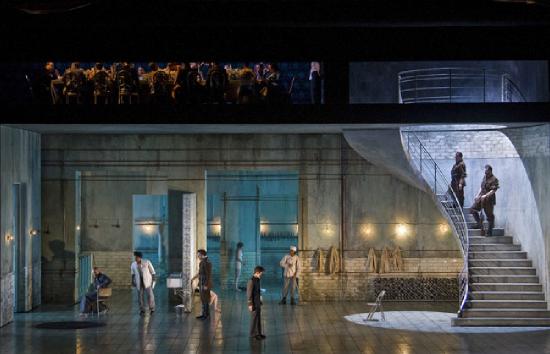
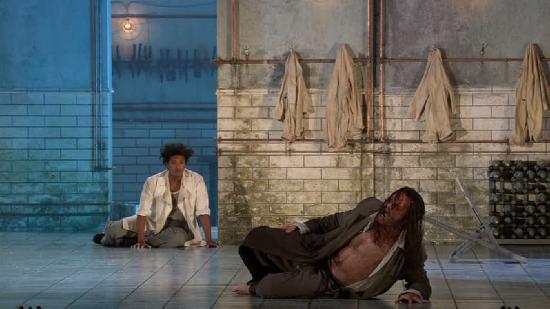
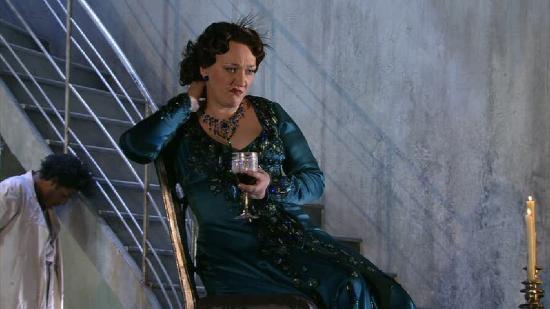
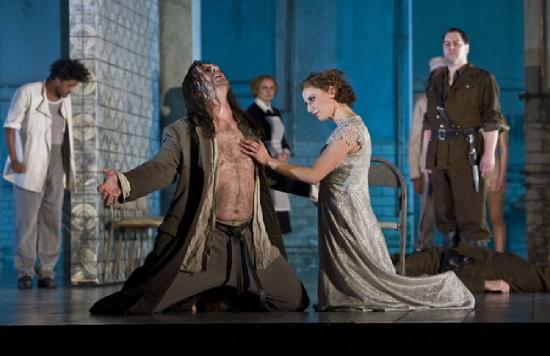
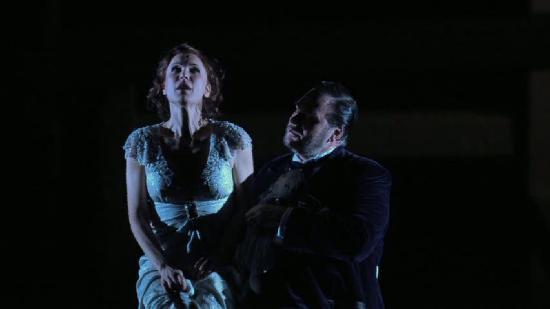
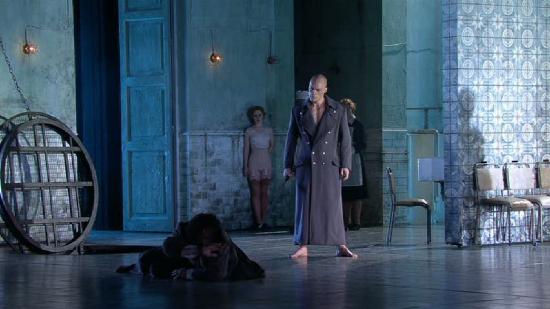
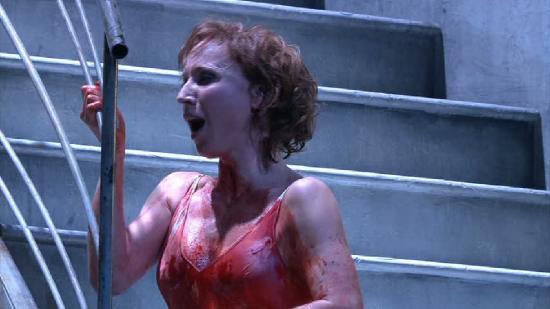
Your Opinions and Comments
Be the first to post a comment!